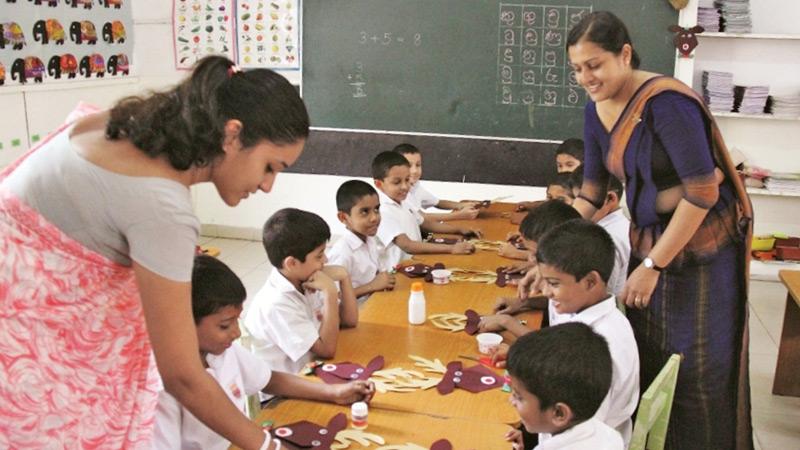
The current Sri Lankan education system has been successful in providing basic skills and a high literacy rate. However, the specific skills and competencies required for modern knowledge-based economic activities have not yet been identified by the system. This has resulted in the inability of students to effectively compete in the local as well as the international labour market. It’s worthwhile to study what has gone wrong.
Our educational institutions have become centres of persistent tension. Equally undeniable is the marked deterioration in the teacher-student relationship which is a sad sign of a society in decline. In this age of coaching centres, private tutors and online learning, the school teacher is no longer recognised as the only source of knowledge.
Also, the devaluation of the teacher’s role has brought about a significant erosion of reverence shown by students to teachers. With teachers more interested in making money, indulging in politicking or busy raising their own demands, the emphasis on teaching has shifted from human resources development to material management.
System change
Decades ago, our teachers insisted on regular homework, practice, library work, interaction among student groups and so on. Today, students are pacified through lectures and notes. This type of learning does not pay off in the long run. It becomes evident only when the ill-prepared students move on to the life career where they cut a sorry figure.
Historically, the teacher was considered an embodiment of service and sacrifice as he was committed to the development of the students’ personality and well-being. With the march of time and the market liberalisation, the concept of materialism gripped the society. As a result, teachers also began to seek their identity in worldly possessions.
The concept of trade unionism gave a fillip to this trend and students were largely forgotten in the process. Teachers tended to consider themselves employees, not guardians of their students, thereby creating a gulf between them and the students.
The British system of education along with the material overtones overshadowed our traditional ethos of cultivating the mind and the soul which help in the process of man’s perfection. Even the British educationist John Stuart Mill said education should contribute to the social rather than the economic development of society.
But with the rapid pace of industrialization and commercialisation, our education system became inextricably linked to economic growth. Education today is essentially a social enterprise.
Relationship
It has become a formal undertaking in which students have to be admitted, teachers recruited, administrators appointed, and grants given to make the enterprise of education profitable.
In consequence, the individual initiative gets depreciated while the formal part plays a major role. However, the fact remains that the task of a teacher is not mere communication of facts or the mechanical imparting of knowledge. The aim of education is to help a student grow into a person who can think independently.
Here lies the importance of teacher-student relationship.
The teacher is not a prop on which the growing plant clings; he is a gardener, watering the plant and nurturing it to grow. A good teacher is admired by his pupils primarily for stimulating the learning process. The student with a growing personality comes in formal contact with the teacher who has a grown-up personality. They are expected to cooperate at the intellectual level though their personality level might clash.
Recruitment
It is therefore desirable that the teacher should have an understanding of the pupil’s personality in terms of growth, development and experience. A natural leader of the pupil would become seasoned and mellow, and over time become a friend, philosopher and guide.
Socrates used to bombard his students with questions most of which he himself answered. But the questions served an important purpose. They stimulated the students to think and evoked responses from them. It was an effective way of animating the mind.
Unfortunately, a teacher is often immune to the fact that a student has a mind of his own. Often intellectual self-regard leads him to reject or discourage the students’ opinion. A student’s perception can stimulate new lines of thought in the teacher and offer him new insights. Hence, to teach is also to learn.
Teacher education in Sri Lanka is a complex system which reflects the intricacies resulting from unmethodical teacher recruitment, deployment, and promotion procedures. In the developed countries only graduates who have followed an adequate initial teacher education program and have a licence or a registration document from a relevant teacher registration board are recruited to the teaching profession. They are initially placed to teach in pre-primary, primary or secondary schools.
However, in Sri Lanka, new graduate recruits to the teacher service are directly placed in schools without any kind of preparation except for a limited training received in the induction programs which lasts less than a few weeks of fulltime participation. The only exception is for B. Ed graduates.
In addition, non-graduate teachers are also recruited by the Ministry of Education and the education ministries of Provincial Governments based on particular needs. The Ministry of Education is expected to recruit non-graduate teachers after completing a 3-year initial teacher education program.
Changes
It is regrettable that Sri Lanka doesn’t have a consistent policy in teacher recruitment. Graduates and non-graduates have been recruited without any professional qualification in teaching.
A survey done a few years ago shows that about 20 percent of teachers in government schools lack any professional qualification in teaching.
The lack of a modern teacher-education system aggravates this situation. Teaching is a highly complex skill, nurtured by a thorough understanding of the students and their learning needs, subject content as well as a host of other skills and values.
It’s time we take a look at our teacher recruitment policy and teacher training policy, if we wish to create and develop a credible education system in Sri Lanka.
